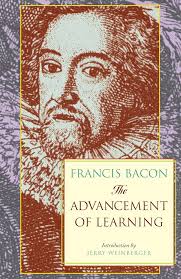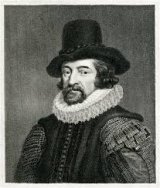The Advancement of Learning Page #29
The Advancement of Learning, published by Francis Bacon in 1605, is a foundational text in the history of science and philosophy. In this work, Bacon advocates for empirical research and the systematic organization of knowledge, laying the groundwork for the scientific method. The book critiques existing scholarly practices and proposes a new approach to learning based on observation and experimentation. It marks a significant shift towards modern scientific inquiry.
- Year:
- 1605
- 1,169 Views
Submitted by acronimous on August 11, 2024
Modified by acronimous on August 11, 2024
philosophy hath received and may receive by being commixed together; as that which undoubtedly will make an heretical religion, and an imaginary and fabulous philosophy. (2) Otherwise it is of the nature of angels and spirits, which is an appendix of theology, both divine and natural, and is neither inscrutable nor interdicted. For although the Scripture saith, “Let no man deceive you in sublime discourse touching the worship of angels, pressing into that he knoweth not,” &c., yet notwithstanding if you observe well that precept, it may appear thereby that there be two things only forbidden—adoration of them, and opinion fantastical of them, either to extol them further than appertaineth to the degree of a creature, or to extol a man’s knowledge of them further than he hath ground. But the sober and grounded inquiry, which may arise out of the passages of Holy Scriptures, or out of the gradations of nature, is not restrained. So of degenerate and revolted spirits, the conversing with them or the employment of them is prohibited, much more any veneration towards them; but the contemplation or science of their nature, their power, their illusions, either by Scripture or reason, is a part of spiritual wisdom. For so the apostle saith, “We are not ignorant of his stratagems.” And it is no more unlawful to inquire the nature of evil spirits, than to inquire the force of poisons in nature, or the nature of sin and vice in morality. But this part touching angels and spirits I cannot note as deficient, for many have occupied themselves in it; I may rather challenge it, in many of the writers thereof, as fabulous and fantastical. VII. (1) Leaving therefore divine philosophy or natural theology (not divinity or inspired theology, which we reserve for the last of all as the haven and sabbath of all man’s contemplations) we will now proceed to natural philosophy. If then it be true that Democritus said, “That the truth of nature lieth hid in certain deep mines and caves;” and if it be true likewise that the alchemists do so much inculcate, that Vulcan is a second nature, and imitateth that dexterously and compendiously, which nature worketh by ambages and length of time, it were good to divide natural philosophy into the mine and the furnace, and to make two professions or occupations of natural philosophers—some to be pioneers and some smiths; some to dig, and some to refine and hammer. And surely I do best allow of a division of that kind, though in more familiar and scholastical terms: namely, that these be the two parts of natural philosophy—the inquisition of causes, and the production of effects; speculative and operative; natural science, and natural prudence. For as in civil matters there is a wisdom of discourse, and a wisdom of direction; so is it in natural. And here I will make a request, that for the latter (or at least for a part thereof) I may revive and reintegrate the misapplied and abused name of natural magic, which in the true sense is but natural wisdom, or natural prudence; taken according to the ancient acception, purged from vanity and superstition. Now although it be true, and I know it well, that there is an intercourse between causes and effects, so as both these knowledges, speculative and operative, have a great connection between themselves; yet because all true and fruitful natural philosophy hath a double scale or ladder, ascendent and descendent, ascending from experiments to the invention of causes, and descending from causes to the invention of new experiments; therefore I judge it most requisite that these two parts be severally considered and handled. (2) Natural science or theory is divided into physic and metaphysic; wherein I desire it may be conceived that I use the word metaphysic in a differing sense from that that is received. And in like manner, I doubt not but it will easily appear to men of judgment, that in this and other particulars, wheresoever my conception and notion may differ from the ancient, yet I am studious to keep the ancient terms. For hoping well to deliver myself from mistaking, by the order and perspicuous expressing of that I do propound, I am otherwise zealous and affectionate to recede as little from antiquity, either in terms or opinions, as may stand with truth and the proficience of knowledge. And herein I cannot a little marvel at the philosopher Aristotle, that did proceed in such a spirit of difference and contradiction towards all antiquity; undertaking not only to frame new words of science at pleasure, but to confound and extinguish all ancient wisdom; insomuch as he never nameth or mentioneth an ancient author or opinion, but to confute and reprove; wherein for glory, and drawing followers and disciples, he took the right course. For certainly there cometh to pass, and hath place in human truth, that which was noted and pronounced in the highest truth:—Veni in nomine partis, nec recipits me; si quis venerit in nomine suo eum recipietis. But in this divine aphorism (considering to whom it was applied, namely, to antichrist, the highest deceiver), we may discern well that the coming in a man’s own name, without regard of antiquity or paternity, is no good sign of truth, although it be joined with the fortune and success of an eum recipietis. But for this excellent person Aristotle, I will think of him that he learned that humour of his scholar, with whom it seemeth he did emulate; the one to conquer all opinions, as the other to conquer all nations. Wherein, nevertheless, it may be, he may at some men’s hands, that are of a bitter disposition, get a like title as his scholar did:— “Felix terrarum prædo, non utile mundo Editus exemplum, &c.” So, “Felix doctrinæ prædo.” But to me, on the other side, that do desire as much as lieth in my pen to ground a sociable intercourse between antiquity and proficience, it seemeth best to keep way with antiquity usque ad aras; and, therefore, to retain the ancient terms, though I sometimes alter the uses and definitions, according to the moderate proceeding in civil government; where, although there be some alteration, yet that holdeth which Tacitus wisely noteth, eadem magistratuum vocabula. (3) To return, therefore, to the use and acception of the term metaphysic as I do now understand the word; it appeareth, by that which hath been already said, that I intend philosophia prima, summary philosophy and metaphysic, which heretofore have been confounded as one, to be two distinct things. For the one I have made as a parent or common ancestor to all knowledge; and the other I have now brought in as a branch or descendant of natural science. It appeareth likewise that I have assigned to summary philosophy the common principles and axioms which are promiscuous and indifferent to several sciences; I have assigned unto it
Translation
Translate and read this book in other languages:
Select another language:
- - Select -
- 简体中文 (Chinese - Simplified)
- 繁體中文 (Chinese - Traditional)
- Español (Spanish)
- Esperanto (Esperanto)
- 日本語 (Japanese)
- Português (Portuguese)
- Deutsch (German)
- العربية (Arabic)
- Français (French)
- Русский (Russian)
- ಕನ್ನಡ (Kannada)
- 한국어 (Korean)
- עברית (Hebrew)
- Gaeilge (Irish)
- Українська (Ukrainian)
- اردو (Urdu)
- Magyar (Hungarian)
- मानक हिन्दी (Hindi)
- Indonesia (Indonesian)
- Italiano (Italian)
- தமிழ் (Tamil)
- Türkçe (Turkish)
- తెలుగు (Telugu)
- ภาษาไทย (Thai)
- Tiếng Việt (Vietnamese)
- Čeština (Czech)
- Polski (Polish)
- Bahasa Indonesia (Indonesian)
- Românește (Romanian)
- Nederlands (Dutch)
- Ελληνικά (Greek)
- Latinum (Latin)
- Svenska (Swedish)
- Dansk (Danish)
- Suomi (Finnish)
- فارسی (Persian)
- ייִדיש (Yiddish)
- հայերեն (Armenian)
- Norsk (Norwegian)
- English (English)
Citation
Use the citation below to add this book to your bibliography:
Style:MLAChicagoAPA
"The Advancement of Learning Books." Literature.com. STANDS4 LLC, 2025. Web. 9 Mar. 2025. <https://www.literature.com/book/the_advancement_of_learning_3165>.








Discuss this The Advancement of Learning book with the community:
Report Comment
We're doing our best to make sure our content is useful, accurate and safe.
If by any chance you spot an inappropriate comment while navigating through our website please use this form to let us know, and we'll take care of it shortly.
Attachment
You need to be logged in to favorite.
Log In